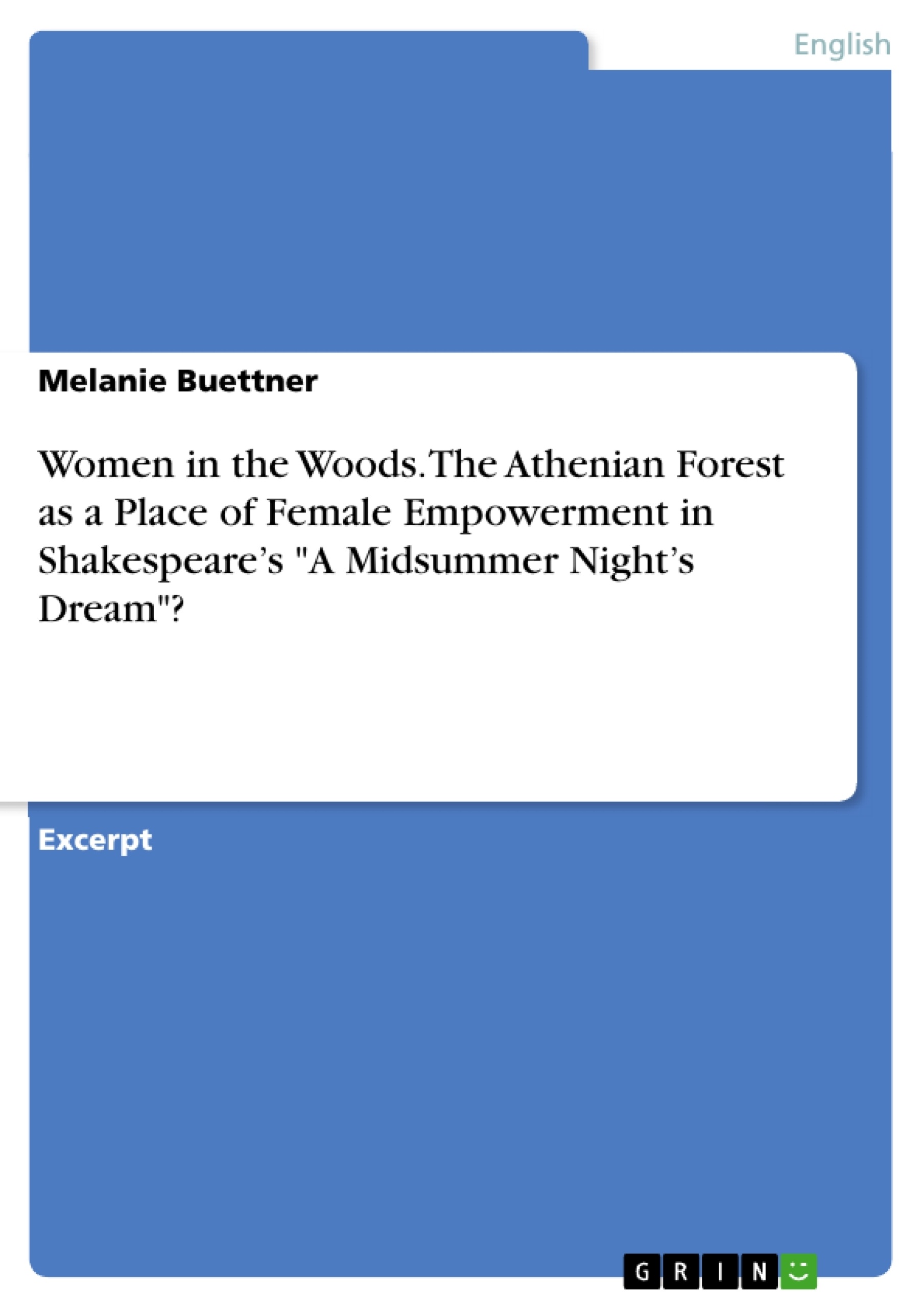This research paper outline presents an abstract, a table of contents, a bibliogrpahy as well as a problem-oriented sample analysis around the topic "Women in the Woods: The Athenian Forest as a Place of Female Empowerment in Shakespeare's 'A Midsummer Night's Dream'."
Feminist scholars have frequently presented Shakespeare’s "A Midsummer Night’s Dream" as a play sympathetic to women. By pointing to Hermia’s recollections of the forest as a place where women can refuge to and are able to speak freely, the Athenian woods, in particular, have been viewed as a kind of female sanctuary free from patriarchal norms. Buccola argues that in the woods women enter the matriarchal domain of the powerful fairy queen and “Fairyland is a space free from sociocultural strictures”. Here, the female is “aligned with the fairies” and she is “linked with them in liminality”. Therefore, in the woods women can “engage in socially aberrant behaviour” without being “subject to the harsh reprisals that might otherwise result from their conduct.”
On the other hand, Roberts objects to this reasoning, contending that the “threat to patriarchy […] is quelled even in the more permissive world of the forest.” For Roberts the forest is a battleground where male-female power relations are fought out, always resulting in the subjugation of the female. Although the “forest trope allows the idea of matriarchy to surface [it] ends by denying it.”
As shown above, casting the woods in "A Midsummer Night’s Dream" as a place of female empowerment, an Anti-Athens, is problematic and in my term paper at hand I am going to demonstrate why that might be the case. I argue that in the forest women are not free to act as they wish, for patriarchal norms do still apply to them there. To support my claim, I will analyse two sections of the play set in the woods, featuring two male-female power struggles: Helena and Demetrius and Hermia and Lysander. Although the women in those chosen passages might, at first sight, give the impression of being self-assertive and independent of thought, a closer reading of the chosen passages will reveal that, in the woods, females are still operating within the confines of a patriarchal system that forces them to adhere to a specific moral code appropriate for women.
Table of Contents
- Women and the Forest in Shakespeare's A Midsummer Night's Dream
- Empowered in the Woods? Female Power Struggles in Shakespeare's A Midsummer Night's Dream
- “Apollo flies, and Daphne holds the chase” – Helena and Demetrius
- "A virtuos bachelor and a maid” – Hermia and Lysander
- The (Dis)empowered Women of Shakespeare's A Midsummer Night's Dream
Objectives and Key Themes
This paper aims to challenge the widely held assumption that the Athenian forest in Shakespeare's A Midsummer Night's Dream serves as a liberating space for women, free from the constraints of patriarchal society. The paper argues that even within the forest, patriarchal norms remain in effect, limiting women's agency and subjecting them to societal expectations. This claim will be substantiated by analyzing specific scenes featuring female characters within the forest.
- The portrayal of the Athenian forest as a place of female empowerment
- The persistence of patriarchal norms within the forest setting
- The limitations placed on female agency and behavior even within the forest
- The consequences of women defying social expectations within the context of the forest
- The interplay of male and female power dynamics within the forest scenes
Chapter Summaries
The first chapter will explore the prevailing interpretations of the Athenian forest as a space of female empowerment. It will examine the arguments presented by scholars like Buccola and Roberts, contrasting their views on the forest's role in challenging or reinforcing patriarchal structures. The second chapter will delve into two specific scenes within the forest, focusing on the power dynamics between Helena and Demetrius, and between Hermia and Lysander. These analyses will illuminate how patriarchal norms continue to shape the actions and choices of female characters even within the supposedly liberating setting of the forest.
Keywords
The core keywords of this paper include: Shakespeare, A Midsummer Night's Dream, Athenian forest, female empowerment, patriarchal norms, power dynamics, agency, social expectations, gender roles, female characters, Helena, Hermia, Demetrius, Lysander, analysis, interpretation.
Frequently Asked Questions
Is the Athenian forest in "A Midsummer Night's Dream" a place of female empowerment?
While some scholars view the forest as a sanctuary from patriarchal norms, this paper argues that patriarchal structures still apply to women even within the woods, limiting their true freedom.
How do patriarchal norms persist in the forest setting?
The analysis of characters like Helena and Hermia shows that their actions and struggles for agency are still dictated by a moral code and social expectations defined by men.
What is the power struggle between Helena and Demetrius?
Helena's pursuit of Demetrius in the woods reverses traditional gender roles ("Apollo flies, and Daphne holds the chase"), yet she remains dependent on his validation and subject to his harsh treatment.
What does the relationship between Hermia and Lysander reveal about gender roles?
Despite fleeing Athens to be together, Hermia must still adhere to the expectations of a "virtuous maid," showing that her behavior is still governed by societal standards of modesty and morality.
What is Buccola's view on "Fairyland"?
Buccola argues that the woods are a matriarchal domain where women are free from sociocultural strictures and can engage in "socially aberrant behavior" without reprisals.
How does Roberts object to the idea of the forest as a liberating space?
Roberts contends that the forest is a battleground where male-female power relations are fought out, eventually resulting in the re-subjugation of the female characters.
- Citar trabajo
- Melanie Buettner (Autor), 2018, Women in the Woods. The Athenian Forest as a Place of Female Empowerment in Shakespeare’s "A Midsummer Night’s Dream"?, Múnich, GRIN Verlag, https://www.grin.com/document/455012



